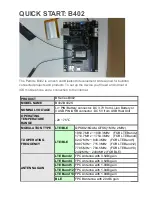...the world's most energy friendly microcontrollers
2014-07-02 - Gecko Family - d0001_Rev1.30
310
www.silabs.com
20 RTC - Real Time Counter
0 1 2 3
0 1 2 3
Quick Facts
What?
The Real Time Counter (RTC) ensures
timekeeping in low energy modes. Combined
with two low power oscillators (XTAL or RC),
the RTC can run in EM2 with total current
consumption less than 0.9 µA.
Why?
Timekeeping over long time periods is
required in many applications, while using as
little power as possible.
How?
Selectable 32.768 Hz oscillators that can
be used as clock source and two different
compare registers that can trigger a wake-up.
24-bit resolution and selectable prescaling
allow the system to stay in EM2 for a long
time and still maintain reliable timekeeping.
20.1 Introduction
The Real Time Counter (RTC) contains a 24-bit counter and is clocked either by a 32.768 Hz crystal
oscillator, a 32.768 Hz RC oscillator. In addition to energy modes EM0 and EM1, the RTC is also
available in EM2. This makes it ideal for keeping track of time since the RTC is enabled in EM2 where
most of the device is powered down.
Two compare channels are available in the RTC. These can be used to trigger interrupts and to wake
the device up from a low energy mode. They can also be used with the LETIMER to generate various
output waveforms.
20.2 Features
• 24-bit Real Time Counter.
• Prescaler
• 32.768 kHz/2
N
, N = 0 - 15.
• Overflow @ 0.14 hours for prescaler setting = 0.
• Overflow @ 4660 hours (194 days) for prescaler setting = 15 (1 s tick).
• Two compare registers
• A compare match can potentially wake-up the device from low energy modes EM1 and EM2.
• Second compare register can be top value for RTC.
• Both compare channels can trigger LETIMER.
• Compare match events are available to other peripherals through the Peripheral Reflex System
(PRS).
20.3 Functional Description
The RTC is a 24-bit counter with two compare channels. The RTC is closely coupled with the LETIMER,
and can be configured to trigger it on a compare match on one or both compare channels. An overview
of the RTC module is shown in Figure 20.1 (p. 311) .
Summary of Contents for EFM32G
Page 505: ......


















